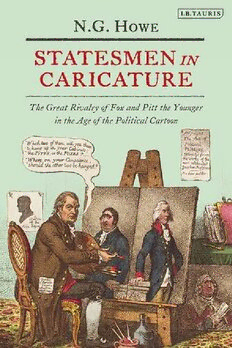
Statesmen in Caricature: The Great Rivalry of Fox and Pitt the Younger in the Age of the Political Cartoon PDF
229 Pages·2018·2.648 MB·English
Most books are stored in the elastic cloud where traffic is expensive. For this reason, we have a limit on daily download.
Preview Statesmen in Caricature: The Great Rivalry of Fox and Pitt the Younger in the Age of the Political Cartoon
Description:
The years 1780 to 1820 have long been seen as the Golden Age of the English satirical print. This period witnessed a number of changes in style which had far-reaching consequences, including an increase in the effectiveness of the caricature as visual propaganda. William Pitt the Younger and Charles James Fox were the leading politicians of the age, continuing a family rivalry begun by their fathers. They were amongst the most caricatured men of their time and became emblems of the two sides of the political debate whilst gathering personal followings, based upon personality rather than filial or political patronage. Fox and Pitt the Younger came to represent a more modern notion of the party leader, in an age before formalized political parties and structures. Neil Howe here shows how `stock images' came to the fore and examines the central role they played within the visual representation of politicians during the late-eighteenth century. His book also chronicles how the biggest political rivalry of the age played out within contemporary caricature, from the emergence of Fox and Pitt as big political beasts in the wake of the American Revolution, through the East India Bill Crisis, Regency Crisis and French Revolution to the death of both men in 1806.
See more
The list of books you might like
Most books are stored in the elastic cloud where traffic is expensive. For this reason, we have a limit on daily download.
